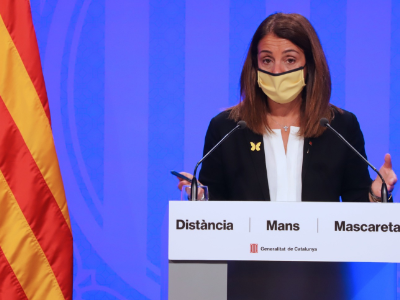- According to the government spokesperson Meritxell Budó, these 20 M€ "will alleviate part of the adaptation needed to carry out online activity at the end of the academic year 2019-2020 as well as the start of the academic year 2020-2021"
- Meritxell Budó assures that the situation of the pandemic indicates "the beginning of a second wave" and that "measures must be taken to reduce social interaction and mobility"

The Government has approved the transfer of 20 M€ from the Contingency Fund to respond to the increase of the unbudgeted expense in the Catalan university system, made up of 12 universities. The crisis arising from the effects of the COVID-19 pandemic has also affected the Catalan university system and universities. "The 20 M€ transferred to the university system will alleviate part of the adaptation needed to carry out online activity at the end of the academic year 2019-2020 as well as the start of the academic year 2020-2021, in the exceptional situation that is being experienced" explained the spokesperson of the Government and Minister of the Presidency Meritxell Budó in the press conference carried out after the Executive Council meeting.
These additional expenses arise from the security measures taken and protection in matters of health, but, above all, they are to cover the costs of adaptation required to carry out mixed teaching, in which both in-person and online learning is combined. This affects physical spaces, material resources or human resources depending on the characteristics of each centre and the nature of subjects taught. This amount will be spent in the technological improvement of the facilities, such as having classrooms equipped with recording systems, reinforcement of cybersecurity and data systems. Also, in updating and expanding teaching support infrastructures, such as acquiring licences for various software or digital teaching content. And finally, for the training of teachers and support staff related to mixed learning and actions to reduce the digital gap for both teachers and students, among others.
Throughout the course and depending on the necessity of greater resources for the university system due to COVID-19, new transfers can be made to finance cost overruns.
Government spokesperson Meritxell Budó: "The situation forces us to anticipate new measures at two levels: reduction in mobility and social interaction
During the press conference, Budó wanted to convey the Government's worry regarding the COVID-19 pandemic evolution in Catalonia. "Data show we are no longer in the stationary situation of the last weeks, but we are starting to increase the number of cases. We are at the beginning of a second wave", Budó said. The risk of outbreak has increased up to 338, the rate of transmission (Rt) is at 1.33 and the number of hospital admissions and patients in ICUs has grown”. "Today, the situation is "very worrying", and forces us "to anticipate new measures that enable us to contain the evolution of the pandemic in our country, measures at two levels: reduction in mobility and social interaction". According to the spokesperson, in this sense, "telework has an important role to play". Currently, approximately 8% of the active population is teleworking. "This 8% could increase up to 25% and we are working with companies and trade unions as representatives of the public administration to promote, recommend and support companies and their employees in order to implement telework and reduce the mobility of many people and thus help to flatten the curve" Budó explained.
The spokesperson called on not dropping out guards, maintaining self-protection measures and adopting the recommendations that will be announced in the following days. "We will announce measures in the following hours, measures that we are discussing with the many sectors affected" Budó said.
When asked by journalists on the strike in primary healthcare, Budó assured that the Government "points out its value and believes the message conveyed needs to be heard" and she assured that "there are discussions going on with the sanitary regions of the country in order to find solutions to the current weaknesses of the primary healthcare of which we are all aware". "We need to be aware of the mental and physical exhaustion of primary healthcare workers who have not stopped working since the beginning of the covid, that is, in seven months. Seven months of uninterrupted work with mental and physical exhaustion due to being in front of the fight against COVID-19" Budó insisted.